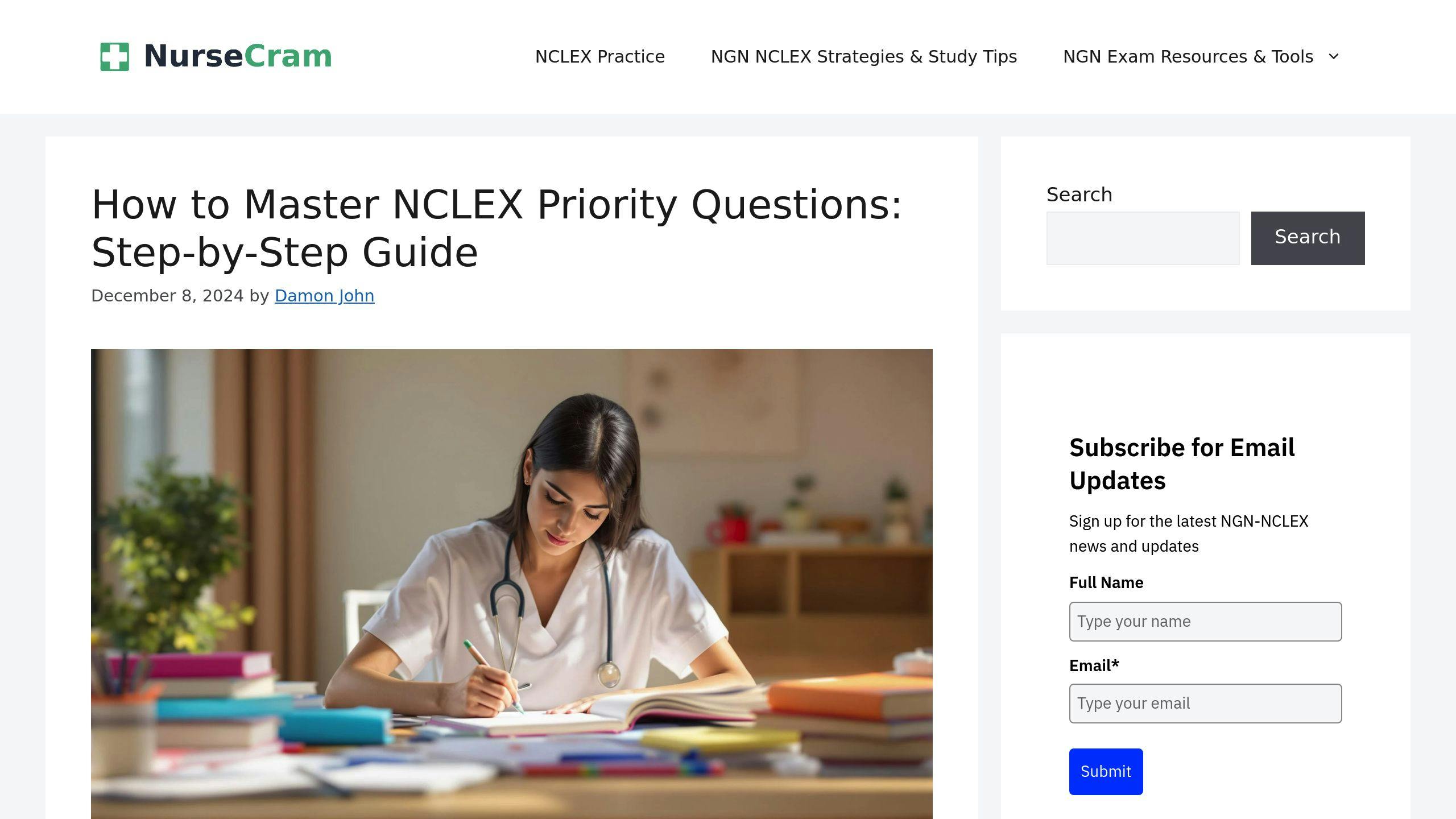Want to pass the NCLEX on your first try? Staying focused is the key to success. Here’s how to prepare effectively:
- Study Smart: Create a schedule with 2-3 hour study blocks, use NCLEX-style questions, and track your progress with SMART goals.
- Stay Calm: Practice mindfulness, deep breathing, and avoid last-minute cramming to reduce stress.
- Test Day Tips: Get enough sleep, pack essentials, and manage your time wisely during the exam.
Focus improves memory, reduces anxiety, and sharpens critical thinking. Follow these strategies to stay sharp and confident throughout your NCLEX journey.
How to deal with NCLEX stress & pass the NCLEX
How to Prepare for the NCLEX with a Clear Focus
Preparing for the NCLEX requires a well-thought-out plan and the right resources. Here’s how you can create an effective study approach to stay organized and make the most of your study time.
Building a Study Schedule That Fits Your Needs
Start by evaluating your understanding of the NCLEX topics. Plan study sessions in 2-3 hour blocks with 15-minute breaks in between. Alternate between harder and easier subjects to keep your mind fresh, and schedule weekly review sessions to reinforce what you’ve learned. Studies suggest that structured sessions with breaks can boost your ability to retain information [1].
Choosing the Right Study Tools
Having the right materials can make a big difference. Use review books for a clear learning path, practice questions to identify areas where you need improvement, and interactive tools for instant feedback. Platforms like Nurse Cram provide scenario-based exercises and detailed explanations, which are great for sharpening critical thinking skills. Study groups can also offer new perspectives and keep you motivated.
Setting Goals and Tracking Your Progress
Set SMART goals – specific, measurable, achievable, relevant, and time-bound – to guide your study plan. Use weekly practice exams to measure your progress and pinpoint areas that need more attention. Adjust your study focus based on these results [3].
"Understanding your strengths and weaknesses is key to building an effective NCLEX study plan" – Crow [1]
Once you have a solid plan and the right tools, focus on strategies to stay engaged and productive during your study sessions.
Tips for Staying Focused While Studying
Practice NCLEX-Style Questions Regularly
Working on NCLEX-style questions is a great way to improve focus and build mental stamina. Set aside 25-minute sessions to tackle specific question types like Select All That Apply (SATA) or drag-and-drop formats. This method helps you develop a systematic approach and stay engaged.
When answering practice questions, follow a step-by-step process: read each question carefully, eliminate incorrect options, and analyze the remaining choices. Always review both correct and incorrect answers to understand the reasoning behind them – this is key to improving your critical thinking skills.
Learn the NCLEX Test Format
The NCLEX uses an adaptive format that adjusts based on your performance, so every question matters. To prepare, simulate exam conditions by practicing in a quiet setting with a timer and a computer. This not only helps you get comfortable with the format but also reduces test-day anxiety.
"Crafting a study plan for the NCLEX begins with understanding your strengths and weaknesses. Dive into the NCLEX subscales and pinpoint where improvement is needed." – Crow [1]
Getting familiar with the test format is a confidence booster, but combining this with mindfulness techniques can help you stay calm and focused throughout your preparation.
Use Mindfulness to Stay Focused
Mindfulness can do more than just reduce stress – it’s a proven way to improve concentration and maintain mental clarity during long study sessions. Try the Pomodoro Technique: study for 25 minutes, take a 5-minute break, and after four cycles, enjoy a longer break of 15-20 minutes.
Start your study sessions with 2 minutes of deep breathing to clear your mind and boost focus. Platforms like Nurse Cram also provide structured practice with scenario-based exercises and detailed review materials to enhance your critical thinking and focus.
sbb-itb-aa73634
How to Stay Calm and Focused on Exam Day
Prepare the Night Before
Set yourself up for a smooth morning by getting everything ready the night before. Gather essentials like your ID, registration confirmation, and a light breakfast. Avoid last-minute cramming – it’s better to aim for 7-8 hours of sleep to keep your mind sharp.
Stay Focused During the Test
Feeling anxious? Try techniques like deep breathing or mindfulness to calm your nerves and refocus. Pay close attention to what each question is asking, and use your nursing knowledge and critical thinking to find the best answer.
"Practicing stress-relief techniques, such as deep breathing and mindfulness, combined with a structured study plan and regular practice, is essential for success on high-stakes exams like the NCLEX." – Crow [1]
For tough questions:
- Carefully read each question twice.
- Identify the main issue being tested.
- Use elimination to narrow down choices.
- Trust the preparation and skills you’ve built.
Use Your Time Effectively
The NCLEX’s adaptive format means you need to balance careful reading with steady progress. Aim to spend 1-2 minutes per question, and take short breaks every two hours. Use these breaks to have a snack, stretch, or take a breather to reset your focus.
If you’re stuck on a question, use elimination strategies and make an educated guess rather than lingering too long. Keep in mind that the test adjusts to your performance, so staying focused throughout is key.
During breaks, step away from the testing area to recharge. Avoid talking about the exam with others – it can increase stress and distract you from the questions ahead.
Extra Tools to Help You Succeed on the NCLEX
Use Nurse Cram NCLEX Exam Review

Boosting your NCLEX preparation often requires more than just personal strategies. Nurse Cram is a resource designed to help you sharpen your critical thinking and test-taking skills. It offers NGN-style practice questions, detailed explanations, and readiness exams that simulate the exam environment. These scenario-based exercises help you stay focused and mentally prepared for the long testing sessions ahead.
Here’s how Nurse Cram can keep you on track:
- Scenario-based exercises that mimic the real exam experience
- In-depth rationales to help you understand and retain key concepts
- Practice tests that build mental endurance for long study sessions
- Guided tools to keep your attention on the most important areas
Find Support from Peers and Groups
While tools like Nurse Cram are great for structured preparation, having a support network can make a big difference in staying motivated. Joining online study groups or setting up regular check-ins with peers can keep you accountable and energized. Collaborating with others also gives you new insights and helps solidify your understanding of tough topics.
Share your progress with your study group to stay on track and motivated. Group discussions can highlight areas where you need extra practice, while working through challenging material together strengthens your overall knowledge.
"Critical thinking is crucial for NCLEX success, as it involves analyzing complex scenarios and making informed decisions. Resources like Nurse Cram help develop this skill by providing scenario-based exercises and detailed rationales that encourage critical thinking and clinical judgment." [2]
Final Advice for Staying Focused and Confident
Take a Full Practice Exam
Taking a full practice test under exam-like conditions can sharpen your time management, build endurance, and help you feel more prepared. Set up a quiet space, stick to scheduled breaks, and avoid using study materials to mimic the real test environment. This approach helps you develop the mental stamina you’ll need on NCLEX day.
Once you’ve completed the practice exam, take time to review your performance. Pay close attention to the questions that tripped you up or took longer to answer. This analysis will highlight areas that need more attention while reinforcing the topics you’re already strong in. While practice builds your mental readiness, don’t forget that staying physically and mentally healthy is just as important.
Take Care of Your Health
Your well-being plays a huge role in how focused and prepared you feel. Getting enough sleep, eating balanced meals, and staying active can improve your concentration and lower stress levels. Simple mindfulness techniques, like deep breathing, can also help you stay calm during study sessions or the exam itself.
"Crafting a study plan for the NCLEX begins with understanding your strengths and weaknesses. Dive into the NCLEX subscales and pinpoint where improvement is needed." [1]
Make sleep a priority, especially in the week leading up to the exam, to keep your mind clear. If you feel anxious, try taking five slow, deep breaths to refocus. Stress management is just as important as study management – when you feel overwhelmed, take short breaks to recharge, and remember to stay hydrated throughout your preparation.
FAQs
What should I do the day before my NCLEX exam?
Preparing the day before your NCLEX exam is all about setting yourself up for success – mentally and physically. Here’s what nursing educators suggest:
Key Preparations:
- Double-check your testing location and plan your route.
- Pack essentials like your ID, Authorization to Test (ATT) letter, comfortable layered clothing, and simple snacks.
- Skip last-minute studying – it often adds unnecessary stress.
Stay Mentally Focused: Instead of cramming, try relaxing activities like light exercise or meditation. These can help clear your mind and keep anxiety at bay without draining your mental energy.
"Crafting a study plan for the NCLEX begins with understanding your strengths and weaknesses. Dive into the NCLEX subscales and pinpoint where improvement is needed." [1]
Evening Routine: A calming evening routine can make all the difference:
- Avoid caffeine after 2 PM.
- Steer clear of heavy meals close to bedtime.
- Aim for 7-8 hours of sleep.
- Use deep breathing exercises to relax.
If you feel anxious, try mindfulness techniques or briefly review test-taking strategies – but avoid intense studying. Taking care of your physical and mental health is key to staying sharp during the exam [2].
Related posts
- Common NCLEX Test Anxiety: Solutions That Work
- Ultimate Guide to NCLEX Study Progress Tracking
- Ultimate Guide to High-Yield NCLEX Topics
- NCLEX Focus Strategies Backed By Research

Sophia is the compassionate and knowledgeable face of NurseCram.com. With a passion for helping nursing students excel, she serves as a supportive mentor, providing practical guidance and insights for mastering the NGN NCLEX exams. Her approachable dedication and dedication to education make her the perfect guide for future nurses striving to achieve their dreams. Sophia is here to simplify your learning journey and empower you to succeed!

